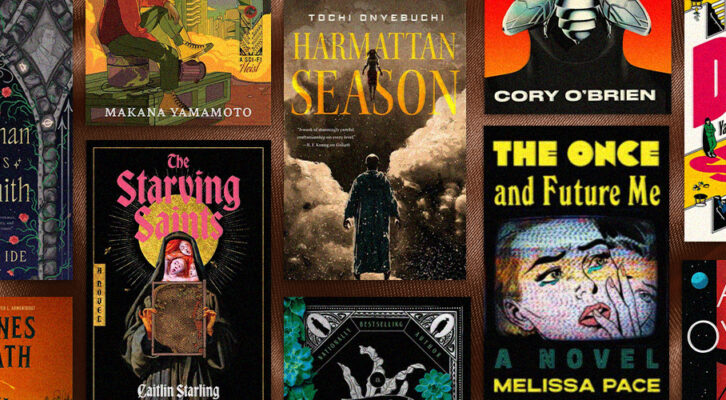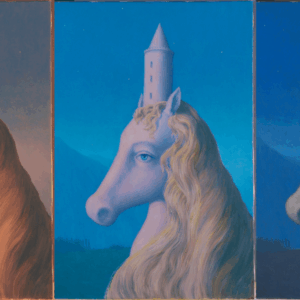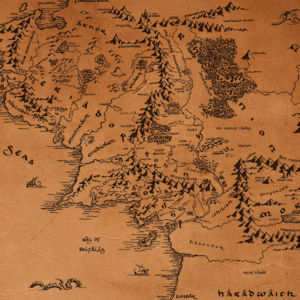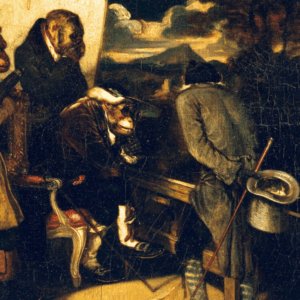
When We Were Young and Lost
Annie McGreevy and Claire Vaye Watkins Talk Mullets and
Immaculate Conception
Annie McGreevy and Claire Vaye Watkins met at the Ohio State University MFA program in 2007. Ahead of the release of Annie’s debut novella, Ciao, Suerte (Nouvella, September 1) and Claire’s second book, Gold Fame Citrus (Riverhead, September 29), the two friends recently sat down on the porch of Claire’s new home in Ann Arbor, Michigan to talk writing, their wayward Ohio days, the benevolence of old white dudes, immaculate conception and self-inflicted mullets.
Annie: You’re a homeowner! And you’re about to start your new job as a tenure track professor at Michigan.
Claire: The tenure track job is comfy and it’s copacetic with the writing life, for the most part. I only worry that it’s too comfortable.
Annie: We’re sitting here on your porch in this beautiful neighborhood. I’m envious of the house and the copacetic aspect of the job, but tell me how that’s affecting your writing.
Claire: I haven’t really written in a long time. Longer than I’m willing to admit, probably. If we had done this interview last night, when we were all drunk, I would’ve admitted how long it’s been since I’ve written, but now I feel shy about it. I feel like it’s not good for an artist to be as comfortable as I am. I just have this kind of very bourgeois, middle-class, comfy life: I’ve paid off my student loans and I have a tenure track job, and a baby and a husband, and a house, and you know, I’m starting to think that writers and artists aren’t really supposed to be in the mainstream in that way. Or, it’s not good for me. I am interested in the margins on the outside of things, but I feel like I’m so—I’m like, right in the middle of the mainstream, so much that I can’t even see the edges anymore, of the stream, you know?
And I just don’t really have the art-making impulse anymore. And I haven’t had it for a long time. And I’m just trying not to freak out about that. I think that would make it worse. I think these things ebb and flow, and you’ve got to replenish the well, and we have all kinds of handy metaphors for it, but I do suspect that it has something to do with arranging my life in a comfortable way.
As I hear myself say that, the voice in my head is going, like, “Oh, wahh, wahh, my diamond shoes are too tight,” “Oh, I have too much money,” but that’s the situation. My diamond shoes are too tight.
Annie: So do you feel like when you were writing Battleborn and Gold Fame Citrus you were more on the edges? You wrote Battleborn in an MFA program.
Claire: I know. It wasn’t like I was living on a commune in Chile or anything. Real bohemians would’ve really been quite bored by my MFA lifestyle. But it did seem at the time—we were both, in retrospect, going through crazy, bananas stuff. We were a mess. We were messes!
Annie: I remember when I met you at some meet-and-greet dinner, you were telling people you were doing some writing in your car. You had that awful apartment, and you didn’t have a computer yet, and you were like, “Yeah, I go in my car and I write in a notebook.” It was hilarious!
Claire: Yeah, because I didn’t have an apartment technically. I bungled the housing thing. And then we were both in these really bad relationship. And my mom had just died, and you had come back from Spain. Remember how you did not understand how self-checkout worked at Lowe’s? You’d walk up, and be like, “What’s happening? I need a checker!” What did we used to call you, the American Foreign Exchange Student?
Claire: But aren’t we just doing that thing, like, “Oh, struggle and pain must be good for art.” Are we just buying into that romantic idea of the tortured artist?
Annie: Maybe
Claire: I’m, in a way, doing it myself.
Annie: Cause you’re not tortured?
Claire: Yeah, it’s like, “I’m not tortured, I can’t write.”
Annie: Well, so, that’s a version of being lost, isn’t it? I’m interested in us both being kind of lost right now. The relationship between being lost and writing.
Claire: Yeah. And because, forgive me if I’m being presumptuous here, but if we were at our respective family reunions…
Annie: Right.
Claire: They’d be like, “Claire’s not lost.” And they’d be like, “Annie, what’re you doing? You’re going to move around, you’re quitting your job, you’re not quitting your job, you can’t decide—you’re writing books…” But reading your work right now, you’re writing better than ever, and you’re writing stuff that you’ve said you could not have written in our MFA program. Whereas I wrote Battleborn and started Gold Fame Citrus in that MFA program.
Annie: Well, that’s something that I think is really important, actually. I went to Catholic school, and had a religious upbringing, and of course like most people with a religious upbringing, I rebelled against it at a certain point. And I also think of an MFA like a religious upbringing. Our MFA program was awesome, and I got so much out of it, I learned just about everything I know about writing from it, but it’s so important to then rebel against it in a certain way. So for me, everything I’ve written since graduating—my initial goal was: Write a story that Lee K. Abbott would hate. And, I love Lee—I learned so much from him, I’m still in touch with him, but he’s in our head so much. You can’t just write stories that Lee K. Abbott would praise for the rest of your life.
Claire: Yes. And you and I—I know we’re not the only people that feel this way, and I think that there’s probably a Lee K. Abbott in every single MFA program in the country, who’s this genius teacher and writer, incredibly charismatic. And he just has a way of getting in your head. Meanwhile, everyone else you and I have ever worked with, in our education or in publishing, has been a woman. Everyone: my agent, my editor, your editor at Nouvella, magazine editors. I mean, they’ve almost all been women, and yet, the voice in our head is Lee K. Abbott.
Annie: I think it’s just what we’ve talked about many times: Old White Men. Some amalgamation of our dads and the male professors we’ve had. I think Lee K.’s a real teacher with a capital T, in addition to being such a great writer, and he just wasn’t afraid to be prescriptive.
Claire: Totally. And it felt good, when you were young and lost, for someone to be like, “On page 1, do this, on page 2, do this”, and that’s not to say that he was having us write the so-called workshop story. I think that’s a lazy, out-of-date way to formulate this idea, but you’re just groping along in the dark, and every once in a while, someone will be like, “Stop using flashy dialogue tags, you look like an idiot,” and you’re like, “Oh my God, thank you so much for just giving me something concrete to hold onto in the wilderness out here.”
Annie: Yeah, exactly.
Claire: But I think, like you said, the voices of Old White Men in our heads, which, why? Because they equal seriousness. I’ve thought so many times: What would Philip Roth think of my novel? And the truth is he’s not going to think a damn thing about it. He’ll never know it exists.
You’re a Roth devotee.
Annie: Yeah, I was teaching “The Breast” one semester, and I had my computer hooked up to the overhead projector, and I Googled something to show them MLA citation stuff. When I started to search for “How do I…?”, the last thing I’d Googled came up, and it was “How do I write Philip Roth a fan letter?”
My students saw it and I was like, “Oh my God, I’m so embarrassed.” I’ve read most of his books, but, the only thing my students had read was “The Breast,” which, you know, I had to warn them: It’s really gross, it’s really disgusting, it’s really sexist, you’re gonna have to kind of buck up, here. And then it turns out their female teacher was stalking Philip Roth.
Claire: One time I was doing a reading in Montana, and I noticed at the end of the line—I mean, the line was maybe six people long, right, it’s not like, around the block or anything—but I noticed at the end of it, there was this old cowboy, and I remember thinking, Hmmm, one of these things is not like the other. Six brunettes with glasses, and then there’s this old cowboy, and when he finally got to the front of the line and I said, “Who should I make this out to?” he said, “You know, I don’t usually read stuff like this, but Tom McGuane said you were all right.” And I was like, “Oh my God, you are actually saying what so many male readers are probably doing with my work, which is like, I’m not going to touch this unless a Tom McGuane…”
Annie: ...tells me to.
Claire: Yeah, and I was like, Wow, you said it out loud. I’m so grateful for the real friendship offered to me by Tom McGuane. He gave me kind of a pep talk and I finished my novel with it in mind. But there’s like, Tom the man, and then there’s… what he represents. And I am grateful for his mentorship and his friendship, but at the same time also resentful and sad that I need it for that reason: that man at the end of the line at that reading in Montana.
One question I have for you: You said after the MFA, you started writing things that would fail in an MFA workshop.
Annie: Yeah. And that’s the best thing I’ve learned, honestly.
Claire: So you have a patricidal impulse? Like, you’re killing your darlings, or your fathers, right? Writing things that would make Lee K. Abbott unhappy. How do you think Ciao Suerte is like that?
Annie: It started off like that. Everything I’ve written since grad school has started off as this is just for fun. It’s just for me, and I’m just going to…
Claire: Just for me, as in, I’m not going to try to get it published?
Annie: Not going to try to get it published, not even going to show it to anyone. Which, quickly, it becomes something else. Well, half of it quickly becomes something else.
Claire: What do you mean?
Annie: I’m writing a story from the point of view of a bedbug right now. You know, it sounds cool, but I have a feeling when I show it to someone, they’re gonna be like, “Uhhhhhh….” Like, the bedbug, she has a showdown with a cockroach, and its arch-nemesis is the dog, and it just wants to be this human lady’s friend, and it’s so much fun to write, but I don’t know if anyone would find it crazy or stupid.
I started Ciao, Suerte when I was living in Ohio, as I still do now. I’m a real Argentinophile. I listen to a lot of Argentinean music and I want to go there but I can’t really afford it, or I just haven’t gotten it together to actually travel there. At the time, my aunt was dying, and it was kind of the first time I was dealing with death as an adult, and there was a lot of drama around her death that I really associated with America. There was some rejection of Western medicine and there was some religious drama that was some distinctly American, Christian religious drama, and I just wanted to leave. I just wanted to check out of the whole situation. So I was like, I’m just gonna write this Argentinean fantasy. I just wanted to go somewhere else. There’s lots of characters in Ciao, Suerte, and we’re in the perspective of all these different people, that’s the kind of thing that people can do—people like Edward P. Jones and Alice Munro. But when you’re 25 and in an MFA program, everyone’s like, “Just slow the fuck down.”
Claire: Pick one POV, there, hotshot!
Annie: Exactly. It took me a while, to legitimately understand how to switch POV—I’m still learning it, and probably will be forever.
Claire: And Ciao, Suerte also moves through time, through politics… it’s zipping all around.
Annie: I was like, I don’t know how to do that, but I don’t care. I just want to check out of my life. And I’m not going to show it to anyone, so I’ll do it wrong, who cares?
Claire: Yes. I think that’s everything. I want to write a thing I don’t know how to write. And then I will only be done, I will only know how to do it when it’s completely finished. And, at that point, I never want to work on it again. It’s over.
Annie: Well, that’s what brings creative people to the creative process, that’s the fun of it. For me, editing and revision are the meat and potatoes of the process, but at a certain point, it starts to feel like math, and it’s not creative, you know? And, so the beginning is the most exciting part, when you’re just like, “Who cares if I show this to anybody? What can I experiment with?”
I actually discovered something recently. I did a writing retreat this week at Ohio State, and we were talking about the writing process a lot, and I was in there with mainly scholars, not creative writers, and so they were talking a lot about ideas, and I realized that for me, an idea, like a really cool idea, will kind of kill a project.
Claire: Interesting! What do you mean?
Annie: Well, the novel I was writing in grad school was—and I still think it’s a good idea—What if these “good,” progressive people, sort of get rubbed the wrong way by an immigrant, and they work to deport him, which they can do pretty easily? But I couldn’t render it. I couldn’t execute the idea.
Claire: Whereas, like, the bedbug—that’s a bad idea.
Annie: I mean, kind of.
Claire: You feel silly when you’re describing it. You’re like, “It’s from the perspective of a bedbug?” But, I can tell when you talk about it, it’s secretly working. Like, “I’m not gonna say it aloud, but I’m working this bedbug story.”
Annie: I think there’s also a difference; like, a short story can handle an idea. And I think novels can, too, I just can’t do it yet. The novel that I just gave up on last year was about a modern day immaculate conception. I was just so proud of this idea, but then I had to do all this work to get into it: Well, she has to be a Mary figure. And there has to be a Joseph figure. And there has to be a religious element to it, you know what I mean? And it just killed it. I just stopped caring about these characters because they have to have all these trappings that line up with the tradition.
Claire: It sounds like, in a way, you were writing that story for the criticism that would be done about it in a hundred years or something.
Annie: Yeah, that’s right.
Claire: I read a lot of books that I feel are written for the scholars of posterity. But not for me, not for a reader at that moment—like, me in my bathtub. That hurts my feelings. That they don’t care about me as a reader, you know?
Annie: Yeah! I mean, when I was talking about the bedbug story in the writing retreat this week with mainly theorists and scholars, I was talking about how I read a lot of “Metamorphosis” stories and how I’m a big Kafka fan, but it can’t just do that. And so many of the “Metamorphosis” stories that have been written recently are so much better than Kafka’s. Because they’re going beyond it. And some of the scholars were like, “No, but, it should emulate the original! It’s really important for it to be a lot like Gregor and a lot like Kafka.”
Claire: Is it like, “We’ve all agreed on Kafka. Don’t fuck with Kafka.”
Annie: Exactly! I think there’s something to that. I read Joyce pretty late, like I’d already read all the people who had been imitating Joyce, and so I was like, I don’t get it—this just, I mean, sure, it’s fine…
Claire: I think it’s always a bad sign when you’ve got a log line. Log lines are bad signs for novels. Or they should be very dumb, like, “Ghost Baby Has Sex With Her Mom’s Boyfriend.”
Annie: I was watching this interview with Zadie Smith, and they were like, “Tell us about NW.” And she was like, “There are some people, and they’re alive.”
Claire: With some stories, you can talk a thing away.
Annie: And, to go back to that worldview thing, I mean, this is sort of embarrassing, but, at 31 or 32, I had to be like, “Well, wait a minute, hold on.” With that novel I gave up on recently, I had to be like, “Women can’t… immaculate conceptions aren’t real.” So then I had to be like, “Well, then what’s this gonna be about?” And then it had to be about rape. Like, she had to somehow have gotten raped. And then I was like, “Oh my God. Did Mary get raped?”
It was embarrassing. I had never really believed in the Immaculate Conception, but I had to face… I had to face up to—I was so sad.
Claire: You were like, Oh, Jesus was a rape baby.
Annie: That’s what you think. But really, it was like this personal thing where I felt like I couldn’t talk to people about it. I felt like it would alienate the people I know who are still practicing Catholics. I felt like it would disappoint people.
Claire: Don’t you think it should? I think you’ve got to trust this impulse you have to move on from it, if that’s what you’re feeling, but I think that you should piss people off.
Annie: I’m sure this is something you’re dealing with now, as your second book is coming out. You know what certain critics are going to say, and you had to have had them in mind in a certain way, right? Like, do you aim to offend a critic, too, or just an imaginary close-minded person?
Claire: My approach is that I refuse to understand what I’m doing from a certain angle. I refuse to look at it the way a literary critic might look at it, or a scholar. Not that I can’t. I’m trained. I have a good education, I can articulate, I can explicate my own work just fine, for a job interview, say. But when I’m working, I don’t say, “Why am I doing this? What does it mean? Is this a motif? What’s the symbolic resonance of this image?” I just go, like, “Hey, fuckin’ fun, cool, weird, yeah!”
I have this picture up in my office that’s above my desk, and it’s a picture of me when I’m like five years old, and I have this mullet haircut that I’ve given myself, and I’m riding a three-wheeler through the desert and I just look like a fucking badass. And I think writing should always be like that. Just like, “Reeeeeeeeer,” blasting through the desert on a three-wheeler with your mullet that you gave yourself, like, I don’t give a fuck.
That’s one of the few things I learned from writing this novel. It’s not appropriate to ask yourself why you’re doing something until very, very far down the road. And there are other good reasons to do something, like it’s fun, or it sounds beautiful, or it’s provocative and complicated, or because you don’t understand it. I find myself much more interested by the work I can’t articulate, I don’t understand, I can’t summarize, I don’t have a log line for. When I can say, Oh, you know, this story is a feminist retelling of this thing, and it means this, that’s a dead fish to me.
We have to destabilize that—we can’t get comfy. It comes back to comfort. You can’t be comfortable when you’re working. You should feel like, a little fun, but queasy, and confused, Why am I writing this bedbug thing? The stories, and the things I’ve written that I still like, I remember being afraid of them as I was writing them. Or a little bit embarrassed. Remember in school, when we would go to a coffee shop and write all day, then wait till happy hour, then drink through the evening and talk about work, and reading and all that? And we’d check in with each other, and say, “What are you working on?” And the best things were like, “A 9/11 story?” And I was like, Oh, God, I feel like an idiot.
Annie: That’s my favorite of your stories!
Claire: Yeah, but I felt like, I don’t know why I’m doing this. I didn’t know exactly what it meant, or what I had to say about it, and I still, when I read my work, I just say, Yeah, if you want, you can read it like that, but it doesn’t belong to me anymore. It belongs to readers now. Which… its nice to let go like that.



















